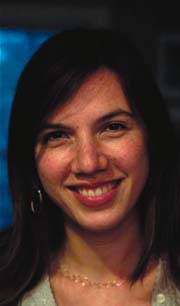|
|
 |
 |
|
AROUND THE QUADSTaking "Frontiers of Science" Behind BarsBy Amanda Erickson ’08 

Claire LePichon teaches a modified "Frontiers of Science" course to prison inmates. 
Armed with only paper, pencils and a chalkboard inside a New York City prison, Claire LePichon ’01 GSAS, ’05 GSAS, ’07 GSAS is explaining to a small group of inmates why some nerves conduct messages up and down the body more quickly then others. She struggles to describe the intricacies of the nervous system until one woman raises her hand and asked if nerves work like the New York City subway — some transmit information locally and others run express. “It was that ‘oh’ moment that students have,” LePichon says. “I was so happy.” That type of moment is the most rewarding part of teaching for LePichon, who did double-duty as a science teacher during the fall semester. At Columbia, she guided a section of first-years in “Frontiers of Science,” the newest element of the Core Curriculum. For the NYC prison system, working with the Bard Prison Initiative (BPI), she volunteered as an instructor, teaching a weekly class modeled on “Frontiers” to a small group of prisoners. Throughout the semester, LePichon covered biodiversity, nanotechnology, neuroscience and astronomy through weekly lectures and small group work at Columbia and at Bayside. “It’s been a great opportunity,” LePichon says. “I’m so glad I did it.” BPI offers 200 men and women at five state prisons a chance to further their education while incarcerated. Volunteers teach college-level courses to inmates, who can eventually write a thesis and earn a bachelor’s from Bard. According to Max Kenner, BPI director, there is a great need for classes like the one LePichon teaches. “There’s no questioning [the students’] interest in science, especially in biology,” he notes. The men and women in the program, Kenner says, are especially interested in learning about the way science affects them — they want to understand diseases that particularly afflict poor communities, and the science of race. LePichon, a 1999 Cambridge University graduate, became involved in the program last summer, when Kenner invited her to teach a science course there. Kenner said friends recommended he contact LePichon, who was studying biology at Columbia, because they thought she might be willing to contribute some time to fill the program’s science hole. BPI had been struggling to find science teachers. The opportunity excited her, she said, but she was nervous about teaching such different classes. She contacted Columbia to see if she could offer a modified version of “Frontiers” to students in the program. Professor of Biology Darcy Kelley, who helped create “Frontiers,” says sharing the program with other schools is exactly what she and others hoped for when they wrote the curriculum. “We want to make the material as widely available as possible,” says Kelley. “Most places have a lot of trouble teaching about science.” Toward this goal, the University is creating a Web site where all the information from the course will be uploaded and available for the general public. The hope, Kelley said, is that more universities and schools will take advantage of the curriculum. While LePichon was able to adapt the class for her work, she says there are some challenges. Most students in the prison classes haven’t studied math or science for years, and several have not graduated from high school. In December, however, four of the students in her Columbia section began working as tutors, coming to LePichon’s weekly classes to provide one-on-one trainings. Thomas Sun ’11, one of LePichon’s students, has worked with young people before, but says he jumped at the chance to teach math at Bayside Prison because it would give him an chance to meet new people. “It seemed like a unique opportunity,” he notes. Amanda Erickson ’08 majors in urban studies.
|
|
||||||||||||||||||||||||||||